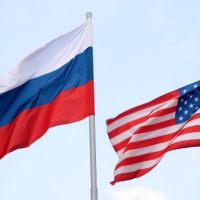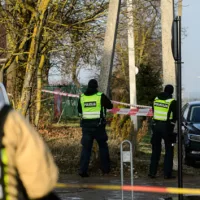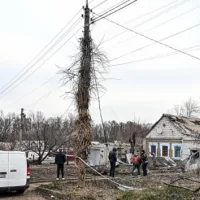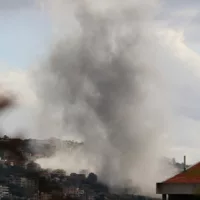
mashabuba/iStock(WASHINGTON) — As the Trump administration ramps up the country’s nuclear capabilities in the latest Fiscal Year 2021 budget proposal, the clock is ticking on the only remaining arms control treaty that keeps the world’s two leading nuclear powers — Russia and the United States — in check.
In a Senate Armed Services Committee hearing Thursday, ranking member Sen. Jack Reed, D-RI, said the treaty’s expiration would signal for the first time in more than four decades that “there is no arms control regime in the world” — which could potentially lead to arms proliferation.
“When we combine the huge numbers of arsenals and potentially even higher numbers of arsenals as New START goes away … that’s a recipe for sort of that return to Cold War-style arms racing that I think people are worried about,” Pranay Vaddi, a Carnegie Endowment for International Peace fellow, told ABC News.
Vaddi, who helped work on New START during his time at the State Department, said that he had expected the increased nuclear investments as a result of an Obama-era nuclear modernization framework and the subsequent impact of the Budget Control Act.
But Vaddi said the efforts to recapitalize U.S. nuclear programs against growing nuclear capabilities from adversaries could not come at a more inconvenient time as the treaty’s days are numbered.
Commander of U.S. Strategic Command Charles A. Richard, who testified at the hearing, addressed concerns over a potential arms race, saying that the idea “baffles him,” as no other nation has done more to reduce reliance on nuclear weapons.
He acknowledged how critical New START has been in providing transparency and information on nuclear threat levels from Russia, but pointed out its shortcomings.
“It does not address a very large class of weapons that the Russians have a significant advantage in … and it is a bilateral treaty,” Richard said. “Ultimately a decision to extend a treaty is a political decision.”
The White House has put off extending the 2011 Obama-Medvedev negotiated treaty in an attempt to bring China into a multilateral nuclear arms agreement.
Tuesday at an Atlantic Council forum, National Security Adviser Robert O’Brien fielded reporters’ questions regarding the United States’ timeline and position on extending New START.
“I think we’ll be sitting down with our Russian colleagues very soon and we’ll be talking about those important issues,” O’Brien told one reporter.
In response to another question, O’Brien invoked the White House’s desire to bring China into negotiations: “Once any potential agreement takes shape, we’ll have to see how the issue of China plays into it. But we’ll get through that as part of the negotiating process.”
A deadline to form a position on New START, however, is something O’Brien said the administration could not predict right now.
As for Russia’s position, the country’s Foreign Minister Sergey Lavrov spoke at a news conference in January, saying that President Vladimir Putin made an offer to extend the treaty as an “insurance policy” while planning multilateral negotiations.
“We suggest extending the New START Treaty without any preconditions … I hope that the Americans have heard us,” Lavrov later said.
Many arms control experts have criticized the administration for not moving forward with extending New START as leverage to bring China into negotiations.
The Arms Control Association responded that the notion of using New START as a bargaining chip is useless, “unless the administration is willing to walk away from the treaty if Russia and China don’t meet U.S. demands for talks.”
Moreover, using the treaty as leverage would be a dangerous risk because the treaty “is too important to be gambled away,” the association said in a statement.
Vaddi also challenged the White House’s strategy of leverage, saying that it only made sense if the administration had an idea of what it wants out of an agreement with China, which the White House has yet to identify.
He critiqued the idea of bringing China into multilateral negotiations since the country’s number of nuclear warheads pales in comparison to that of the U.S. and Russia, a counterpoint that other arms experts have raised. China also does not perform its nuclear operations in the same manner that U.S. and Russia do.
As the U.S. continues to hold off, lawmakers, advocates and political figures have echoed a growing concern over the fate of New START.
On Feb. 5, the treaty’s anniversary, Senate Foreign Relations Committee Ranking Member Sen. Bob Menendez and House Foreign Affairs Committee Chair Rep. Eliot Engel published a joint statement urging for its extension, calling the treaty an “indispensable pillar of security.”
Former U.S. Secretary Madeleine Albright and former Russian Foreign Minister Igor Ivanov penned an op-ed in the New York Times earlier this week as a Hail Mary to push for the extension of New START.
Last year, Sen. Todd Young (R-Ind.) and Sen. Chris Van Hollen (D-Md.) introduced a bipartisan bill that calls for the extension of New START following the United States’ withdrawal from the Intermediate-Range Nuclear Forces Treaty.
“The collapse of New START would be a global disaster – and can be avoided at the stroke of a pen,” said Derek Johnson, executive director of the international Global Zero movement, an international group that seeks to eliminate all nuclear weapons.
Whether an arms race will happen or not, Vaddi suggested that it would be in Russia’s interest to play the responsible party as opposed to producing more nuclear weapons if the treaty were to expire.
“The U.S. and Russia would not benefit from engaging in any kind of conflict that involves these weapons,” he said.
Copyright © 2020, ABC Audio. All rights reserved.















